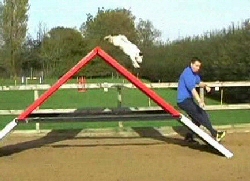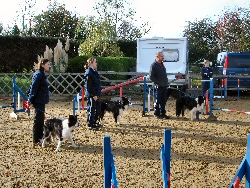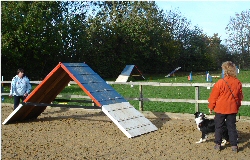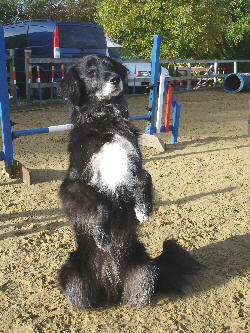| |
Moving the sport on
 Peter
van Dongen, British Agility World Championships Team Vet, recently took part in a rather
special agility weekend, organised by Steve and Yvonne Croxford, of PACE Agility (Performance
Agility Coaching and Evaluation). It was called the PACE-Agility Performance Academy, and it
was meant to be an agility weekend with a difference. Well, it certainly was! But that's not
why he wrote this article. Peter
van Dongen, British Agility World Championships Team Vet, recently took part in a rather
special agility weekend, organised by Steve and Yvonne Croxford, of PACE Agility (Performance
Agility Coaching and Evaluation). It was called the PACE-Agility Performance Academy, and it
was meant to be an agility weekend with a difference. Well, it certainly was! But that's not
why he wrote this article.
Lots of people have been to
agility days or weekends where experienced and highly regarded agility trainers put you through
your paces and tell you what handling techniques you might want to use for getting those weaves
right, or getting those contacts etc. Nothing wrong with that, of course, as you will always
learn a great deal from various different perspectives.
 The
PACE course however, is based on a very different approach. Steve and Yvonne have developed a
course, based on Sports Coaching, Sports Science and Sports Psychology along with more
traditional agility training techniques. It combines methodology from totally different sports,
such as rugby, football or even golf, with science-based knowledge about the mental approach to
competition and the evaluation of sports performance, using specially designed computer
software for sports, called Quintic. The
PACE course however, is based on a very different approach. Steve and Yvonne have developed a
course, based on Sports Coaching, Sports Science and Sports Psychology along with more
traditional agility training techniques. It combines methodology from totally different sports,
such as rugby, football or even golf, with science-based knowledge about the mental approach to
competition and the evaluation of sports performance, using specially designed computer
software for sports, called Quintic.
There were only six people
at my particular course, so we got a lot of personal attention during the weekend which was run
jointly by Steve and Yvonne which meant lots of friendly banter! We also got lots of
talks, in the form of PowerPoint presentations, and were shown video footage from various
sports to make certain points. On top of this, we obviously went outside with our dogs
five collies and Sky, my little JRX - to do ‘proper’ agility, both in the sand school behind
Steve’s house, and in the grass field behind that. Several exercises were videoed by Steve, for
later analysis and discussion, and we got some special tasks set by Yvonne, again for later
discussion.
 On
top of this, we did SAQ exercises, based on, again, human warming up exercises used in other
sports, to learn how to properly warm ourselves up for agility. The dogs did DAQ, a program
developed by Steve himself, based on SAQ, using similar types of exercises, but adjusted for
the dog, to learn how to properly warm up your dog for agility. Finally, after the event, we
all got sent a certificate as well as a CD-Rom with our dog’s video footage on it, together
with a special version of the sports science computer program, to get the best out of the
footage. All very professional! On
top of this, we did SAQ exercises, based on, again, human warming up exercises used in other
sports, to learn how to properly warm ourselves up for agility. The dogs did DAQ, a program
developed by Steve himself, based on SAQ, using similar types of exercises, but adjusted for
the dog, to learn how to properly warm up your dog for agility. Finally, after the event, we
all got sent a certificate as well as a CD-Rom with our dog’s video footage on it, together
with a special version of the sports science computer program, to get the best out of the
footage. All very professional!
All-in-all we all had a
great time and learnt a lot. The dogs were tired, but not over-tired, as they had loads of
resting time, when we were doing the class room routine. I would thoroughly recommend this
course to everyone who wants to learn something new, wants to take things more seriously as a
‘professional’ dog handler, and wants to have a record of their dog’s performance, to use for
setting goals and challenging themselves during subsequent training sessions.
 My
main reason for writing this My
main reason for writing this
For the last year, Steve and I have been talking about what we can do to take the sport of dog
agility to the next level.
For some time now it has been clear that there is a need for people within the
discipline of agility - or any other form of dog sports for that matter - to have access to
sound advice on sports science as it relates to canine athletes, canine sports medicine and
orthodox as well as complementary veterinary therapies. It seems that, at the moment, the only
scientific material available relates to Greyhound racing.
It is also clear that there is a need to draw various experts together to ensure
that there is common agreement about what is good advice and sound practice when training your
dog for active sports, for warming dogs up before competitions and for keeping them fit
throughout their lives.
Canine Sports Seminar
It is because of this that Steve and I decided to organise a seminar, with the help
of The Kennel Club, specifically about Canine Sports Science, subtitled A scientific
approach to the canine athlete. The day brings together several experts in their field, to
offer presentations about subjects like
-
Kennel Club Health Schemes
-
Nutrition for the Canine Athlete
-
Nutraceuticals
-
Massage techniques
-
Passive Movement Exercises
-
Biomechanics
There will also be a discussion of the results of a survey on agility related
injuries in dogs.
We think the time has come to take canine sports more seriously and to treat our
canine friends more as 'athletes'. We also hope that this will be the beginning of a time
where experts come together to further research in the field of canine sports science. There
may be more seminars to follow if this first one is successful.
If you are interested in the Canine Sports Science
Seminar, you will have to order your tickets soon! Tickets cost £60.00, which includes VAT, all
refreshments and a three course lunch, a delegate’s pack and presentation handouts. Any profits
made at the seminar will also be donated to the Kennel Club Charitable Trust, which works to
help make a difference for dogs by funding a wide variety of work ranging from supporting
research into canine diseases to welfare initiatives and the promotion of dogs, all of which
help to provide dogs with healthier and happier lives.
Please have a look at the Kennel Club web site
www.the-kennel-club.org.uk , or on the E-vents page of
www.agilitynet.com , on how to order your tickets!
| |
|